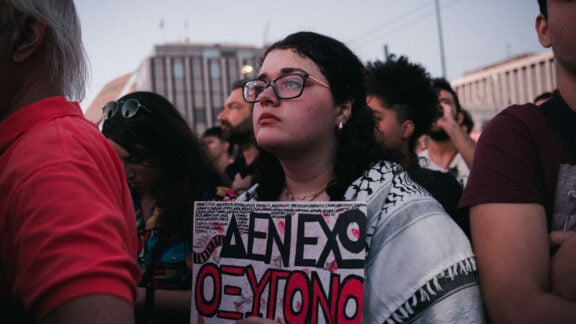In the second book of the Iliad, the Greeks gather after Achilles has withdrawn in rage. As they look to an uncertain future, a man named Thersites stands to speak. The narrative notes his ugliness and connects his deformed appearance to his disordered speech and tendency to criticise the war leaders. However, when he addresses the Greeks, he voices many of the same objections Achilles made in the epic’s first book.
Achilles’ dissent was met with argument and Nestor’s failed attempt at de-escalation when Thersites meets Odysseus. The wily hero of the Odyssey threatens Thersites, takes the sceptre, and physically beats him out of the assembly. As he does so, the narrative shifts to the watching mass of Greek warriors who laugh, “even though they are aggrieved” and remark that “this is the best thing that Odysseus has ever done.”
Protests and Power
Classical scholars have long been perplexed by this sequence of events. Does re-packaging Achilles’ protests from book 1 in the disturbed body and mouth of Thersites discredit them? Are the Greeks laughing despite their general grief or despite being upset by/with Thersites? In the Republic, Plato has his Socrates worry that the mere detail of Achilles—not to mention Thersites— insubordinance is a dangerous lesson to offer the young.
Modern Scholars like William Thalmann and Peter W. Rose have seen Thersites as representing political pluralism in the world of epic poetry and its audiences. The argument goes that through a double ideological move, dominant narratives like the Iliad appropriate rival ideologies and tame or otherwise neutralise them.
I have had a similar feeling of perplexity—with a rising horror—in witnessing the quashing of dissent on college campuses in the United States over the past few weeks. As the violence has increased, I have been thinking constantly about how our humanistic traditions position us to think through relationships across ideology, dissent, and power. What are the core values of the traditions we teach, and how have they shaped us today? The Iliad seems to imply that only certain people have the authority to speak ”truth to power” and that those whose bodies or backgrounds set them apart can expect violent reprisal if they speak out.
Odysseus and the Suitors
I keep returning to the image of that audience of Greek warriors laughing in discomfort. Perhaps their laughter is a relief—their entire world and mission are upended by Achilles’ rejection of Agamemnon and the Greek coalition in Book 1. If anything, their response is about restoring stability, not facing the uncertainty and ambiguity of their whole worldview being questioned. Anyone who has lived during times of upheaval and violence can likely empathise.
A more complex—but valuable—case is the suitors in the Odyssey. Most readers take the Homeric epic at face value when it depicts them as transgressing the laws of hospitality, conspiring to murder Telemachus, and abusing a disguised Odysseus in his own home, all to justify their deaths at the poem’s conclusion. Yet, when I teach the Odyssey, I ask students to consider the suitors as protesting their lack of political power.

These men grew up after Odysseus left for Troy—they barely knew Odysseus or a world of political order at all. The epic confirms that Ithaca went twenty years without an assembly or council meeting, functioning for decades without any governance. Furthermore, if we read the Odyssey closely (especially Teiresias’ prophecy in book 11), we learn that the suitors did not descend on the household until seventeen years had passed.
When Odysseus returns home, he has lost his entire army (twelve ships of men). He does not attempt to talk to the people he is supposed to rule, and Odysseus disarms them so he can murder them in his household. If the case of Odysseus and the suitors were a simple one, why would the epic narrative take such pains to show the suitors doing wrong repeatedly, why would it differentiate them and give them individual characteristics, and why would it end with the families of the murdered suitors splitting a vote about whether or not to prosecute Odysseus for his crimes?
Appropriation and Ideology
When people write about the politics of the Odyssey, they often follow Thalmann and Rose in sensing a tension between emerging democratic/aristocratic values and an older oligarchic/monarchic strain. The lack of conclusion at the epic’s end is, on the one hand, a kind of ideological evasion, a characteristic resistance to a simple lesson or message. But I think that the visceral focus on the violence, on the other hand, still communicates to audiences of all backgrounds the potential cost of strife and dissent. When Athena magically stops continuing violence between Odysseus and the suitors’ families, she tells them that they need to forget their past suffering to let “wealth and peace be enough”.
In recent years, we have seen many conversations debating to what extent classical texts are implicated in, if not responsible for, some of the horrors of what some still call ”western civilisation”. The debate has often been too stark. It struggles as a corrective against simplistic worship of the past, the instrumentalisation of history to serve current power structures embedded in race, gender, sex, ability, and nation.
However, scholars have convincingly argued that narratives like the Odyssey and the Iliad demonstrate some of the foundational values of colonialism, racism, and the destruction of the environment. Such arguments do not call for rejecting these texts but rather a more thorough understanding of their use and misuse. The end of the Odyssey is unsettling, but the violence meted out within Odysseus’ home should be disturbing. Epic enacts a dizzying dialogue that leaves us standing, grasping for answers.
Regarding protest and power, the Iliad and the Odyssey offer not a guidebook but a series of object lessons about what happens when the ”wrong” people engage in dissent. Classicists are often happy to discuss two kinds of freedom of speech in the Greek world. Isegoria is equal access to political speech, a bedrock of any quasi-democratic community. It is often contrasted with parrhesia, a more personal blank check to say whatever one wants.
The suitors and Thersites are denied both, and are violently silenced. Each epic shows how their dissent is discredited and how the mechanisms and representatives of power restore order. This, too, is the inheritance of the ”western tradition”. As the bogeyman of ”cancel culture” has been set aside to ask us to worry about safety on college campuses, our disenfranchised youth are learning similar lessons. But they face the same essential question: what recourse do members of a community have against state violence if they are denied the right to speech and political power?
I have spent all of my adult life in higher education. I am already too old to be naive, yet still enough of an idealist to be heartbroken at the rapid and wide outbreak of militarised violence against student protestors. At this point, it is clear that the essentially conservative function of higher education should belie universities’ reputations for progressive thought and action.
But where does that leave us? The Homeric epic remains an apt metaphor for this struggle between what our institutions do in the world and what we wish them to be. The very word University implies an inclusive embrace of difference. Like epic—or any other artefact—the institution is subject to the same plays and misplays of power as anything else.
As the majority of us watch students protest here and the continuing violence in Gaza, we stand like those worn-out warriors around Troy. Epic—and education—offers complex answers to visceral questions. Sometimes, we choose simple conclusions because they are comforting. Yet, pluralism requires accommodating discomfort; resisting autocracy also means tolerating views you cannot share. The eventual outcome of refusing both is violence and more to come.
Joel Christensen is Professor and Senior Associate Dean for Faculty Affairs at Brandeis University. He has published extensively and some of his work include Homer’s Thebes (2019) and A Commentary on the Homeric Battle of Frogs and Mice (2018). In 2020, he published The Many-Minded Man: the Odyssey, Psychology, and the Therapy of Epic with Cornell University Press.









